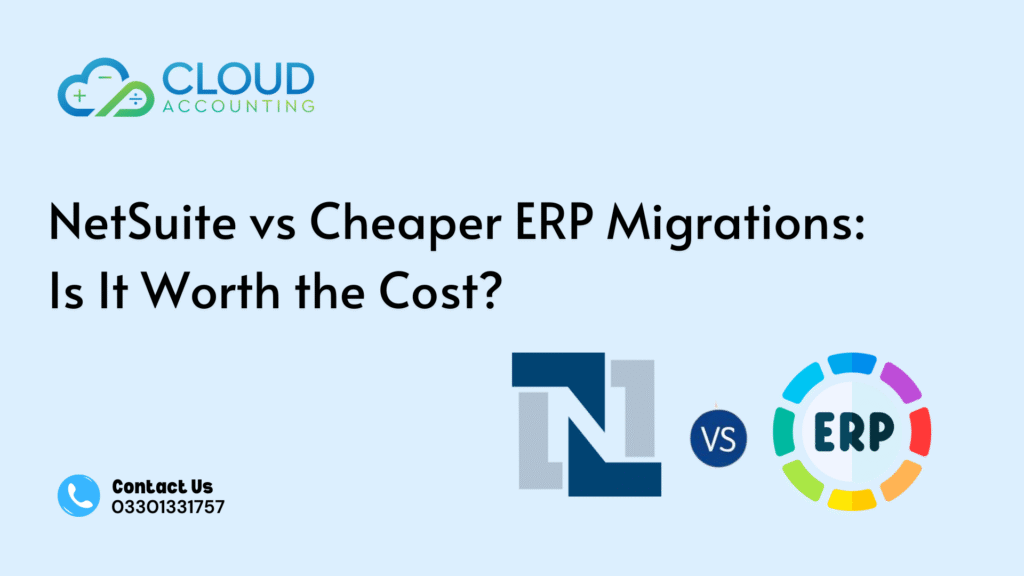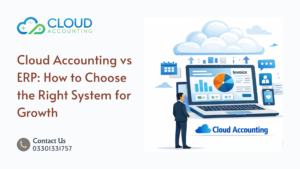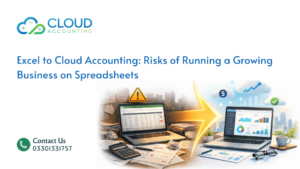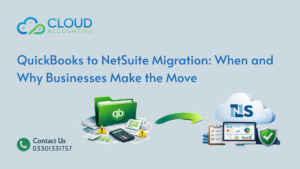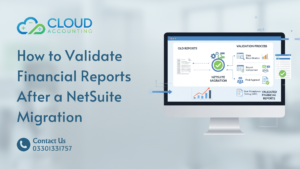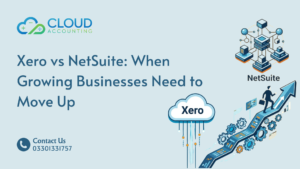When evaluating an ERP migration, one question consistently challenges CFOs and IT leaders: Is NetSuite worth the extra cost compared to cheaper ERP systems?
Enterprise Resource Planning (ERP) software lies at the heart of every growing business — unifying finance, operations, and data. While NetSuite is widely recognized as a premium, full-featured cloud ERP, there are numerous lower-cost alternatives that promise similar outcomes at a fraction of the price.
But here’s the real issue: migration costs go far beyond the initial software license. The total cost of ownership — including data migration, customization, training, and ongoing support — can dramatically change the financial equation.
In this guide, we’ll break down the NetSuite vs ERP migration cost debate, comparing upfront expenses, hidden costs, and long-term ROI. By the end, you’ll have a clear framework to decide which ERP investment truly delivers value for your business.
Understanding ERP Migration Costs
Before comparing NetSuite vs ERP migration cost, it’s essential to understand what’s actually included in an ERP migration project. Many businesses underestimate the time, effort, and hidden costs involved — leading to budget overruns or poor implementation outcomes.
What ERP Migration Really Includes
Migrating to a new ERP system isn’t just about installing new software. It’s a complex process that typically includes:
- Data migration – extracting, cleaning, and transferring data from legacy systems.
- Customization & configuration – tailoring modules to match your workflows.
- Integration – connecting your ERP with CRM, eCommerce, and other business tools.
- Training & change management – helping teams adopt new processes and systems.
- Testing & deployment – ensuring the system works seamlessly before go-live.
Each of these stages carries its own costs — in time, resources, and external consulting fees.
Why Migration Costs Vary
ERP migration costs can vary significantly depending on factors like:
- Company size and complexity – the more data and processes, the higher the cost.
- Customization level – off-the-shelf vs highly tailored solutions.
- Cloud vs on-premise ERP – cloud solutions like NetSuite often lower maintenance costs but may have higher setup fees.
- Implementation partner rates – experienced consultants charge more but often reduce long-term risk.
A smaller company might spend $20,000–$50,000 on a simple migration, while enterprise-level projects can easily exceed $500,000.
Short-Term vs Long-Term Cost Factors
While cheaper ERP options may seem attractive upfront, long-term costs often tell a different story. Ongoing support, system upgrades, and scalability should all be part of the budgeting equation.
The right question isn’t “How much does migration cost?” but rather “What value does the migration deliver over time?”
NetSuite Migration Overview
When businesses consider upgrading their ERP, NetSuite consistently emerges as a top choice — and for good reason. As a cloud-based ERP designed for scalability, automation, and real-time financial visibility, NetSuite offers robust functionality that cheaper ERP systems often struggle to match. But with that comes a higher migration cost that CFOs must justify.
What Makes NetSuite a Leading Cloud ERP
NetSuite provides an all-in-one solution that integrates accounting, CRM, inventory, HR, and eCommerce into a single platform. Its biggest advantages include:
- Cloud accessibility – enabling remote, multi-subsidiary, and global operations.
- Automation capabilities – reducing manual work and human error.
- Scalability – easily adapts to business growth without heavy reconfiguration.
- Real-time insights – advanced reporting and analytics for better decision-making.
These features deliver measurable efficiency gains, but they also make the migration process more intricate compared to basic ERP tools.
Typical Costs of Migrating to NetSuite
While pricing can vary based on business size and customization, a typical NetSuite migration includes:
- Licensing fees – based on modules and user count (starting around $999/month).
- Implementation services – configuration, setup, and testing ($25,000–$100,000+).
- Customization and integration – linking NetSuite to existing systems ($10,000–$50,000).
- Training and support – for finance and operations teams ($5,000–$20,000).
In total, a standard NetSuite migration cost can range between $40,000 and $150,000, depending on complexity and business needs.
Common Migration Challenges
- Data accuracy issues during migration.
- Underestimating customization timelines.
- Insufficient user training leading to slow adoption.
- Choosing the wrong implementation partner.
However, when managed properly, NetSuite migration delivers significant ROI — particularly for companies aiming for automation, scalability, and unified reporting.
Cheaper ERP Alternatives – What You’re Paying For
When evaluating NetSuite vs ERP migration cost, many CFOs consider budget-friendly alternatives that promise similar functionality at a fraction of the price. These options can be appealing, especially for small to mid-sized businesses looking to modernize quickly. However, it’s essential to understand what you’re actually getting — and what you might be giving up.
Examples of Low-Cost ERP Systems
Some of the most common alternatives to NetSuite include:
- Odoo – an open-source ERP offering modular pricing.
- Zoho ERP – integrates well with Zoho’s suite of business tools.
- QuickBooks Enterprise – strong for accounting, but limited ERP functionality.
- SAP Business One – a mid-tier ERP often used by smaller enterprises.
These systems typically have lower licensing fees and implementation costs, making them attractive for businesses with tighter budgets or simpler operations.
Where You Save
- Lower upfront costs for licensing and setup.
- Simplified configuration with fewer customization requirements.
- Shorter implementation timeline — go live faster.
- Smaller consulting teams or internal setup possible.
For startups or small companies, these savings can make a big difference early on.
Where You Compromise
However, cheaper ERP options often come with trade-offs:
- Limited scalability – may not support multi-entity or international operations.
- Manual workflows – fewer automation features compared to NetSuite.
- Weaker integrations – difficulty connecting with third-party apps.
- Higher long-term costs – due to add-ons, maintenance, and eventual system replacement.
Comparing NetSuite vs Cheaper ERP Migration Cost
When weighing NetSuite vs ERP migration cost, it’s crucial to look beyond the initial setup fee. The real difference lies in the total cost of ownership (TCO) — which includes implementation, customization, support, and scalability over time.
A low-cost ERP may seem budget-friendly upfront, but NetSuite’s value often becomes clear when businesses consider long-term growth and automation needs.
Initial Setup Costs
| Cost Element | NetSuite | Cheaper ERP Systems |
| Licensing Fees | $999–$3,000/month (based on modules & users) | $200–$800/month |
| Implementation | $25,000–$100,000+ | $5,000–$25,000 |
| Data Migration | $5,000–$15,000 | $2,000–$10,000 |
| Training & Support | $5,000–$20,000 | $1,000–$5,000 |
| Estimated Total (Initial) | $40,000–$150,000 | $10,000–$40,000 |
At first glance, the NetSuite migration cost appears much higher. However, this investment buys access to enterprise-grade automation, integration, and scalability — features that cheaper ERPs typically lack.
Hidden & Ongoing Costs
Many businesses underestimate hidden costs associated with cheaper ERPs, such as:
- Additional integration fees for third-party software.
- Manual process inefficiencies that reduce productivity.
- Frequent upgrades or add-ons that increase costs over time.
- Future migration costs when switching to a more capable system later.
NetSuite’s higher upfront price often offsets these long-term expenses through built-in scalability and reduced operational friction.
Long-Term ROI
CFOs who focus solely on initial expenses risk missing the bigger picture. NetSuite’s total ROI often surpasses cheaper ERPs within 2–3 years due to:
- Streamlined workflows and automation.
- Improved financial reporting accuracy.
- Reduced dependency on IT resources.
- Better decision-making through real-time insights.
For businesses planning sustained growth, NetSuite becomes a strategic asset — not just a software cost.
Case Example: Mid-Sized Company Comparison
A growing eCommerce company evaluated NetSuite vs a cheaper ERP.
- Year 1 cost: NetSuite $120K vs Cheaper ERP $35K.
- Year 3 total cost: NetSuite $150K vs Cheaper ERP $95K.
- But by Year 3, NetSuite automated 70% of reporting, cutting finance labor by 30%.
The CFO’s Perspective – Value Over Price
When analyzing NetSuite vs ERP migration cost, CFOs know that software decisions are about more than just upfront expenses — they’re strategic investments that impact efficiency, reporting accuracy, and long-term profitability.
A cheaper ERP might fit today’s budget, but if it can’t scale, automate, or integrate effectively, the business could face even higher costs down the line. NetSuite, while more expensive initially, often delivers greater lifetime value through operational efficiency and scalability.
How CFOs Evaluate ROI
CFOs typically look beyond licensing fees to assess total business impact. The key evaluation metrics include:
- Total Cost of Ownership (TCO): factoring in migration, maintenance, and future scalability.
- Process Efficiency Gains: automation reduces manual effort, freeing staff for strategic work.
- Financial Visibility: accurate real-time data for decision-making and compliance.
- Risk Mitigation: reliable audit trails, data integrity, and security.
When measured across these dimensions, NetSuite often demonstrates a higher net ROI than cheaper ERP systems within 2–4 years.
Cost-Efficiency vs Strategic Scalability
Cheaper ERP systems may offer temporary cost-efficiency, but they can quickly become roadblocks to growth. As business needs evolve — multi-entity accounting, global operations, or advanced analytics — organizations often face additional costs to upgrade or replace limited systems.
NetSuite’s scalability ensures that you invest once, grow continuously, and avoid repeated migration cycles — a critical factor in long-term financial planning.
When NetSuite Makes Financial Sense
NetSuite is the smarter financial choice if your organization:
- Plans for rapid growth or multi-location operations.
- Needs real-time financial visibility and advanced reporting.
- Relies on automation to streamline finance and operations.
- Prefers one integrated system over multiple disconnected tools.
For CFOs focused on sustainability and scalability, NetSuite’s total value far outweighs its initial migration cost.
How to Decide Which ERP Fits Your Business
Choosing between NetSuite and cheaper ERP systems isn’t just a financial decision — it’s a strategic one that determines how efficiently your organization operates for years to come. To make the right choice, CFOs and business leaders should evaluate both quantitative costs and qualitative value drivers.
ERP Evaluation Checklist
Before committing to an ERP migration, consider the following factors:
| Evaluation Area | Questions to Ask |
| Business Complexity | Do you manage multiple entities, currencies, or subsidiaries? |
| Scalability Needs | Will your ERP support long-term growth without major upgrades? |
| Integration Requirements | Can the ERP seamlessly connect to your CRM, HR, and eCommerce tools? |
| Customization & Flexibility | Can it adapt to your unique workflows without heavy development costs? |
| Total Cost of Ownership (TCO) | What are the true 3–5 year costs, including support and upgrades? |
| User Experience & Training | Is it intuitive for finance and operations teams? |
| Vendor Support | Is reliable support and regular product improvement included? |
This structured evaluation ensures you’re comparing systems based on value — not just sticker price.
Total Cost of Ownership (TCO) Framework
To accurately compare NetSuite vs ERP migration cost, CFOs should calculate the TCO over at least 3–5 years. Include:
- Software licensing & implementation fees
- Maintenance and support contracts
- Customization and integration costs
- Productivity savings through automation
- Potential costs of future migrations
In many cases, NetSuite’s higher upfront investment translates into lower long-term TCO due to reduced rework, stronger automation, and fewer system limitations.
When to Choose NetSuite vs a Budget ERP
- Choose NetSuite if: you’re scaling fast, managing complex finances, or require automation and visibility across multiple departments.
- Choose a Cheaper ERP if: you’re a startup or small business needing basic functionality with minimal customization.
Ultimately, the best ERP isn’t always the cheapest — it’s the one that delivers maximum business value for every dollar invested.
Final Thoughts — Is NetSuite Worth the Migration Cost?
When comparing NetSuite vs ERP migration cost, the decision ultimately comes down to one key factor: long-term value versus short-term savings.
Cheaper ERP systems can deliver immediate relief for smaller budgets, offering essential functionality and faster implementation. However, as your business grows, those savings can quickly disappear through hidden costs, limited scalability, and the need for frequent upgrades or replacements.
On the other hand, NetSuite’s higher initial investment often pays for itself through:
- Automation that reduces manual work and errors.
- Scalability that supports multi-entity or global expansion.
- Real-time insights that empower faster, data-driven decisions.
- Lower long-term maintenance and reduced reimplementation risk.
For CFOs and decision-makers focused on sustainable growth, NetSuite isn’t just an ERP platform — it’s a financial strategy.
Yes, the NetSuite migration cost is higher, but so is the return. Investing in NetSuite means investing in a foundation built for the future — one that grows with your business instead of holding it back.
Ready to Plan Your NetSuite Migration with Confidence?
Migrating to a new ERP is one of the biggest financial and operational decisions your business will make — but you don’t have to navigate it alone.
At Cloud Accounting, we help CFOs and finance leaders plan, budget, and execute successful NetSuite migrations that deliver measurable ROI. Our experts handle every stage — from cost analysis and data migration to configuration and training ensuring a smooth transition and maximum value from day one.
Book a Free NetSuite Migration Consultation Today.

